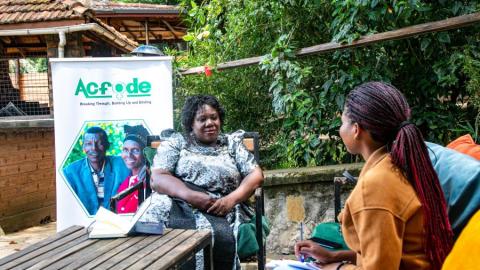
The Solidarity for African Women’s Rights (SOAWR), a coalition of over 80 civil society organizations spanning 33 countries, has long championed gender equality across the African continent. Established in 2004, SOAWR focuses on ensuring the rights of women and girls, as outlined in the Protocol to the African Charter on the Rights of Women in Africa (the Maputo Protocol), are prioritized by policymakers.
In commemoration of 20 years since the inception of the Maputo Protocol, SOAWR, alongside partners like ACFODE (Action for Development), launched the "20 Voices, 20 Reasons" campaign in October 2023. This initiative aimed to capture diverse perspectives on various protocol articles, fostering discussions on their importance and domestication across the board.
ACFODE participated in the campaign by documenting high-quality clips featuring voices from different sectors of Ugandan society like academicians, cultural figures, politicians, and civil society actors. The focus lay on 5 key articles of the protocol that align with the work ACFODE does; Article 2 which is about the Elimination of Discrimination Against Women, Article 5 which is on the Prohibition of Harmful Practices Against Women, Article 9 which highlights the Rights to Participation in the Political and Decision-Making Process, Article 12 that emphasizes Right to Education and Training and Article 13: which encourages Economic and Social Welfare Rights.
During the campaign, five influential figures shared their views on Uganda's progress in implementing the protocol and offered recommendations for its popularization. Dr. Nakafeero Angella emphasized the need to eliminate practices limiting women's and girls' rights, particularly harmful traditional practices like Female Genital Mutilation and childhood marriages to mention but a few.
Owek. Christine Mugerwa stressed the importance of involving cultural leaders in decision-making processes since they understand the plight of their people more than anyone, this makes it easier to prevent harmful practices, echoing in reference to Article 5.
Prof. Ahikire Josephine highlighted the role of civil society and academic institutions and challenged them to not only hold the government accountable but also implement the Maputo Protocol.
Aligning with Article 9. Dr. Shallon Atwiine applauded Uganda's strides in education especially the introduction of Universal Primary and Secondary Education which she says is inclusive for many Ugandans. Ms. Orikiriza Rusia emphasized the need for strong partnerships between the government, private actors and Civil Society Organisations to enhance economic and social welfare, echoing sentiments in Article 13.
The documentary was shared on social media platforms since it was largely online and also intended to reach a wider audience and was able to reach over 680 people across YouTube, Twitter and Facebook. The anticipated outcomes include increased awareness of the Maputo Protocol's significance and progress in its implementation, as well as strengthened networking and knowledge sharing on its status.
This proactive involvement by ACFODE showed its dedication to advancing gender equality and women's empowerment in Uganda, setting a precedent for collaborative action in achieving the objectives outlined in the Maputo Protocol.
